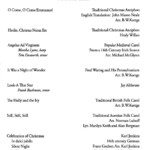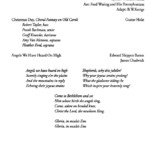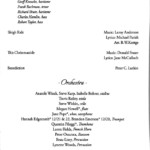Mary and Joseph, Herod the Nut, and you
Sermon preached this morning, December 29, at the Deer Isle/Sunset Congregational Church, UCC, a reworking of a sermon first preached nine years ago in Waterloo …
Oh God, help me. I see her as mine only, and I’m not what she thinks …
That’s Joseph, praying to God about his relationship with Mary, in a play written by William Gibson. Almost ten years ago, the church I pastored in Waterloo, Iowa, staged Gibson’s Christmas play, titled “The Butterfingers Angel.” You may know of Gibson as the author of another play, “The Miracle Worker,” based on the life of Helen Keller. In “Butterfingers Angel,” Joseph prays …
Oh God, help me. I see her as mine only, and I’m not what she thinks, I’m not strong, only you know what a weakling you made me, envious of men and frightened of women and not good, only you know how evil, and even the love she counts on is more of my self than of her. God, help me to be what she thinks I am.
Now you won’t find that prayer in the Bible, but this is Joseph as Gibson imagines him. Actually, Gibson’s imagination goes into overdrive in this play. Its full title is “The Butterfingers Angel, Mary & Joseph, Herod the Nut, & The Slaughter of 12 Hit Carols in a Pear Tree.” That’s a mouthful! And, yes, in the play you will find Joseph and exactly twelve Christmas carols and a pear tree and a nutty, crazy Herod … and Mary. This is what Mary prays when she hears from the angel that she is going to have a baby …
Oh God, let him be healthy and happy, I don’t care if he’s all that special or even a girl, just let me deserve this baby! … Did I say that?
This is a different sort of Christmas play with a different sort of Mary and Joseph, a Mary and Joseph unsure of themselves, full of longing and doubt, needy, needy of love, but afraid of love, too, wanting to do the right thing, or at least wanting to want to do the right thing, but unsure of themselves, still stumbling and imperfect in their attempts to do the right thing, still hesitant and imperfect in their attempts to show love. In other words, a Mary and Joseph like you and like me.
That’s what I so much enjoyed as I watched this play nine years ago — Mary and Joseph are like us! Is this what they were really like? Who knows? The Bible gives us little detail about their personal lives because it’s not their story. But they have to be like us, don’t they? In some way, Mary and Joseph have to be like us.
Retellings of the Christmas story that portray Mary and Joseph as larger than life, solemn and sure and saintly, really do us a disservice, because then they are larger than life, because then the blessings that came to them could never come to us, and the parts they played in the unfolding of the drama of salvation could never be played by the likes of us.
The Joseph and Mary of “Butterfingers Angel” are not the real Joseph and Mary, but they are real, and in that respect this is a faithful retelling of the story, because Joseph and Mary were real. In the face of what they could not fully understand, in the face of an uncertain and unpredictable future, in the face of their own weaknesses and doubts and human frailty, they said “Yes” to God, and so provided a place for Jesus. They provided a place for Jesus to be among us.
And we can, too. When we say, “Yes” to God, we are like Mary, we are like Joseph, providing a place for Jesus to be among us, to be among us here in the midst of our lives as they are: broken and beautiful, stumbling and imperfect, filled with doubt and with hope.
There is another element in “Butterfingers Angel” that is rather unusual for a Christmas play. In the midst of the drollery and the banter, the silliness and the light-heartedness, there is an ever present undercurrent of evil — evil, in and around and about, taking different forms, looking out from different faces, but always there, always lurking, always with a stake in the events that unfold.
How many times have you seen a Herod figure in a nativity scene? But Herod belongs there! Herod is part of the story!
When we tell the story, we tend to focus on singing angels and happy shepherds and adoring wise men. But remember, Luke includes shepherds in his story because they were poor, and Matthew includes visitors from the east in his story because they were from the east, because they were foreigners, Gentiles, outsiders. Our Bible purposefully tells the story of Jesus’ birth in a way that reminds us that Jesus comes for the sake of the poor and for the sake of the stranger. Jesus comes for the sake of the poor and for the sake of the outsider. Jesus comes for them.
And angels? What are we to make of singing angels? Not much. Not too much. Angels are simply messengers, bearers of God’s good news.
But Herod was there, too, and evil was there, too, a part of Jesus’ story from the beginning. From the beginning there was resistance to Jesus’ purpose, from the beginning there was opposition to the good news he came to bring, from the beginning there was a determination to sabotage everything he came to accomplish, from the beginning and for the duration of Jesus’ life.
You’ll find this hostility in Jewish kings and Roman procurators, in conservative Pharisees and liberal Sadducees, in rich folks who cannot let go of what they have and fearful folks who cannot let go of what they’ve always believed or always been led to believe.
You’ll find it in Herod. But the evil is bigger than Herod and all the rest. Herod is victim as well as villain, pushed and pulled and used by powers far beyond his own.
Paul put it this way in one of his letters: “We are not fighting against human beings but against the wicked spiritual forces in the heavenly world, the rulers, authorities, and cosmic powers of this dark age.” We are not up against Herod, but up against the cosmic powers that work through Herod.
Now, to be clear, I am not talking here about demons or about Satan. I am talking about the powerful forces that surround us and seduce us and insinuate themselves into us, hardening our hearts and twisting our minds, powerful forces that push us and pull us and bring us and those near to us to grief.
I am talking about greed and envy and pride, anger and apathy and untamed desire.
I am talking about suspicion and prejudice and narcissism and disdain.
I am talking about lovelessness and carelessness and corruption and deceit.
I am talking about … sin.
Sin has a powerful hold on us, on all of humanity, and, from the beginning, sin saw Jesus as a threat to its power, so sin did its best to get him out of the way. Sin hounded Jesus all his life — defying him, tempting him, trying to trap him, attacking him, grieving him — and, in the end, sin had its way with him. In the end, sin succeeded in getting Jesus out of the way. Didn’t it?
Or is there more story to tell?
But here, at the story’s beginning, it is good to remember Herod. Otherwise, we might be tempted to think of Jesus’ birth and his life as a beautiful and wonderful gesture from God that somehow went wrong, that somehow didn’t work out the way God intended. But, from the beginning, Jesus came to stare down and stand up to the cosmic powers of this dark age. From the beginning, Jesus came to challenge the forces that hold us in their tight grasp.
From the beginning, Jesus came to set us free! Joseph was told to name him “Jesus,” because “he will save his people from their sins.” Because he will set us free from our bondage to hatred and greed and lust for power. Because he will set us free from our subservience to fear and pride and self-preservation. We are enslaved, we are in chains, we are lost, lost in the darkness of our own aimlessness and sin, but Jesus comes to lead us out of darkness.
Gibson’s play ends with Herod and his soldiers combing the streets of Bethlehem, searching out all the infant boys to put them to death. Oh, the horror! But it is an equal horror that innocent men and women and children still must forfeit their lives as the price to keep powerful people in power.
Jesus escaped the slaughter then because Joseph and Mary took him and fled to Egypt. Matthew seizes on this detail, reminding us: “This was done to make come true what the Lord had said through the prophet, ‘I called my Son out of Egypt.’”
The prophet Matthew cites was Hosea, Hosea remembering the Lord calling Israel out of Egypt as a beloved child. Because the Lord heard the cries of the people of Israel and saw their suffering, because the Lord loved them, the Lord called them out of Egypt, making them his own and setting them free from their slavery, setting them free for a life lived in communion with him.
Matthew wants us to know that Jesus was called out of Egypt, too, because God is bringing his people out of Egypt again, because Jesus is like a new Moses, faithfully serving God by leading his people, all God’s people, all people, out of slavery, setting us free from the powerful forces that push us and pull us and destroy life, setting us free for a life lived in communion with God, a life of love, a life of peace, a life of shalom.
This is the Christmas story and this is its meaning for us. We provide a place for Jesus to come among us, to come among us in the midst of our humanness, in the midst of our uncertainty and frailty and brokenness, to come among us to heal us, to fight for us, to break sin’s hold on us, to make us new, to make of us a new people of God, a people formed by love not fear, by generosity not greed, by faith not despair, a people no more divided by class or gender or race or position, a people no more clinging to idols of money or social status or military might, but a people clinging to God, a people in love with God, a people who bring God delight and a people to whom God brings joy.
Joy to the world, the Lord is come! Glory to God in the highest heaven and peace on earth …
Peace on earth to all those with whom God is pleased. Peace on earth to all those whom God loves. Peace to you.
 My Christmas Day project — an herbal gingerbread house.
My Christmas Day project — an herbal gingerbread house.


